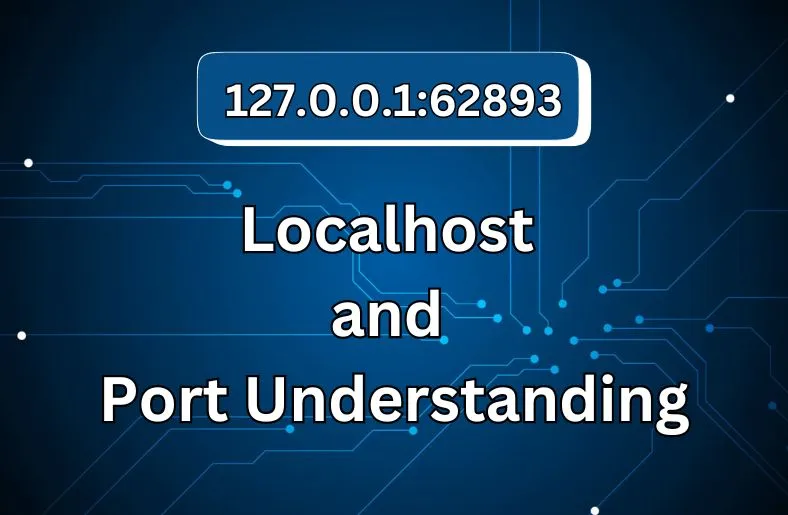Introduction
Welcome to the world of tech mysteries! Today, we’re unraveling the secrets behind a unique digital address: “127.0.0.1:62893”. This combination may seem like a string of random numbers, but it holds the key to understanding a fundamental concept in computer networking. In this blog post, we’ll decode the significance of “127.0.0.1:62893” and explore its role in the digital landscape. Get ready to embark on a journey into the heart of localhost basics!
This address might sound complex, but fear not – we’ll break it down into simple terms. By the end of this post, you’ll have a clear understanding of what “127.0.0.1:62893” represents and why it’s crucial for developers and tech enthusiasts alike. So, grab your digital magnifying glass and let’s dive into the intriguing world of IP addresses and ports!
In this article, we’ll delve into the basics of networking, demystify the concept of “localhost”, and uncover the practical applications of “127.0.0.1:62893”. Whether you’re a seasoned developer or a curious beginner, there’s something here for everyone. So, without further ado, let’s embark on our journey of discovery into the fascinating realm of computer networking.
Understanding IP Addresses and Ports
In the digital world, every device has a unique identifier called an IP address. This address serves as a digital address for devices, much like how your home has a physical address. Think of it as a phone number for computers – it helps them communicate with each other over the internet.
Now, let’s talk about ports. Ports are like doors on a computer that allow data to flow in and out. They act as entry points for information, enabling communication between different applications and services. Each port is assigned a specific number, ranging from 0 to 65535.
When you see an IP address followed by a colon and a port number, such as “127.0.0.1:62893”, it means that a specific communication channel is being opened on that device. In this case, “127.0.0.1” represents the localhost, or the device itself, while “62893” is the port number being used for communication.
Understanding how IP addresses and ports work together is essential for navigating the digital landscape. It’s like knowing how roads and highways connect different places – without this knowledge, data wouldn’t be able to travel from one device to another.
The Basics of “127.0.0.1:62893”
Let’s dive into the basics of “127.0.0.1:62893” and unravel its mysteries. When you see this combination, it’s like your computer talking to itself within its own little world. The “127.0.0.1” part is known as the loopback address, or localhost, pointing back to your own device. It’s where your computer looks when it wants to talk to itself, like having a conversation in a mirror.
Now, let’s talk about the “:62893” part. This is the port number, which acts as a specific entry point on your computer. Think of it as a door that data can go through to enter or leave your device. Ports help different applications on your computer communicate with each other efficiently.
So, when you combine “127.0.0.1” with “:62893”, you’re essentially opening up a special channel of communication on your local machine. It’s like having a private chat room where your computer can send messages to itself.
Understanding how “127.0.0.1:62893” works is essential for developers and tech enthusiasts. It allows them to test applications locally, debug software, and troubleshoot network issues within their own environment. It’s like having a secret playground where you can experiment and play without affecting anyone else.
Common Uses of “127.0.0.1:62893”
Let’s explore the common uses of “127.0.0.1:62893” and unlock its practical applications. Developers often leverage this address and port pairing for testing and debugging purposes. It’s like having a virtual playground where they can experiment with software before deploying it to live servers.
One common use is for testing applications locally. Developers can run their software on their own machine using “127.0.0.1:62893” as the address. This allows them to see how their application behaves in a controlled environment before releasing it to the public.
Another use is for debugging purposes. When developers encounter issues with their code, they can use “127.0.0.1:62893” to troubleshoot and identify the problem. It’s like having a magnifying glass that helps them zoom in on the issue and fix it quickly.
Additionally, “127.0.0.1:62893” enables secure communication between different components of an application running on the same machine. This ensures that data is transmitted safely and efficiently within the local environment.
Moreover, developers can use “127.0.0.1:62893” to validate network configurations and test APIs. By directing traffic to the localhost, they can simulate real-world scenarios and ensure that their applications function correctly in different environments.
Security Concerns and Precautions
Let’s delve into the critical aspect of security concerns and precautions when dealing with “127.0.0.1:62893”. While localhost connections are generally safe, it’s essential to be aware of potential risks and take appropriate measures to protect your system.
One major concern is the possibility of unauthorized access to your local system through this address. Hackers can exploit vulnerabilities in your network if proper security measures are not in place.
To mitigate this risk, it’s crucial to implement strong authentication measures. This ensures that only authorized users can access your system and prevents unauthorized access.
Another precaution is to restrict access to “127.0.0.1:62893” within your trusted network. By limiting access to trusted users, you reduce the risk of external threats attempting to connect through this address.
Regular monitoring of network traffic and logs can also help detect any suspicious activities or unauthorized attempts at accessing “127.0.0.1:62893”. This allows you to take immediate action in case of a security breach.
In addition, keeping all software up to date is essential to prevent vulnerabilities from being exploited. Regularly updating your operating system, firewall, and antivirus software ensures that your system is protected against the latest threats.
By staying vigilant and proactive in maintaining the security of your localhost connections, you can ensure a safe networking environment for your systems and data.
How to Troubleshoot Issues with “127.0.0.1:62893”
Let’s explore some effective strategies for troubleshooting issues with “127.0.0.1:62893”. When encountering connectivity problems, it’s essential to follow a systematic approach to identify and resolve the issue promptly.
Firstly, check if port 62893 is being used by another application on your system. You can use command line tools or check the task manager for conflicting processes.
Next, ensure that the service associated with localhost (127.0.0.1) and port 62893 is running correctly. Restarting the service can sometimes resolve connectivity issues.
If you’re still facing difficulties, consider temporarily disabling your firewall or antivirus software. Sometimes, these programs can block the connection to “127.0.0.1:62893”.
Double-check your network configurations and settings to ensure there are no misconfigurations causing the issue. Incorrect network settings can sometimes prevent access to localhost.
Troubleshooting technical glitches may require patience and persistence. Take the time to investigate each step thoroughly and don’t hesitate to seek help if needed.
By following these troubleshooting steps, you can effectively identify and resolve issues with “127.0.0.1:62893”, ensuring smooth connectivity for your local applications and services.
Conclusion
In conclusion, “127.0.0.1:62893” serves as a vital component in computer networking, offering developers and tech enthusiasts a powerful tool for testing, debugging, and troubleshooting applications locally. By understanding the basics of IP addresses, ports, and localhost, individuals can harness the full potential of this unique address. However, it’s essential to remain vigilant against potential security threats and take proactive measures to protect system integrity. With effective troubleshooting strategies in place, users can ensure seamless connectivity and optimize performance for their local applications and services. Embrace the power of “127.0.0.1:62893” and unlock endless possibilities in the digital realm.





